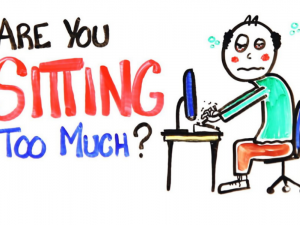Is Sitting Bad for Your Health ... and Waistline?
What the Surprising Research Reveals
©2018 Health Realizations, Inc. Update
As you read this, you’re probably sitting - a motion done by all of us countless times a day. We sit to eat, to work, to relax, to converse, to socialize ... to engage in infinite moments of our lives.
Yet as research would have it, this very simple and often necessary act could be insidiously harmful to your health in a surprising number of ways.
"Chair time is an insidious hazard because people haven't been told it's a hazard," Marc Hamilton, Ph.D., a professor of biomedical sciences at the University of Missouri in Columbia, told Ivanhoe Broadcast News.
According to Hamilton, numerous studies show rates of heart disease, diabetes and obesity are doubled and even tripled in people who sit a lot. Part of the problem with sitting is that it stops the circulation of lipase, an enzyme that breaks down fats. So instead of being burned by your muscles, when you’re sitting fat recirculates in your bloodstream where it may end up stored as body fat, clogging arteries or contributing to disease.
In fact, simply standing up as opposed to sitting engages muscles and helps your body process fat and cholesterol in a positive way, regardless of the amount of exercise you do.
Sitting Less May be Just as Important as Regular Exercise
We all know we’re supposed to get regular exercise to stay healthy. What you may not know is that all the time you spend sitting rather than exercising may significantly reduce or totally negate the benefits of exercise.
In other words, research by Hamilton and others found sitting not only has a negative effect on fat and cholesterol metabolism, but also stimulates disease- promoting processes. What’s more, exercising, even for an hour a day, does not reverse this effect.
"The enzymes in blood vessels of muscles responsible for 'fat burning' are shut off within hours of not standing," Hamilton said on ScienceDaily.com. "Standing and moving lightly will re-engage the enzymes, but since people are awake 16 hours a day, it stands to reason that when people sit much of that time they are losing the opportunity for optimal metabolism throughout the day."
This may be one reason why sitting can cause you to gain weight. A study in the International Journal of Obesity and Related Metabolic Disorders found those who had high daily levels of sitting (7.4 hours or more) were significantly more likely to be overweight or obese than those who reported low daily sitting levels (less than 4.7 hours a day).
A study in the American Journal of Preventive Medicine even found that the longer a person sits at a desk at work, the greater their chances are of being or becoming overweight. Sitting for long hours also puts you at risk of back pain, particularly if you sit with poor posture, leg cramps, tense muscles and, of course, out of sheer boredom.
Tips for Sitting Less and Getting Healthy
Standing up requires your muscles to work to support your weight and hold you upright, to the extent that it can double your metabolic rate. In fact, the average person can burn 60 extra calories each hour just by standing instead of sitting. Over the course of a day, this can add up to a lot of beneficial health effects.
The good news is you’ve already accomplished the first step towards sitting less, by actually realizing that you should sit less. Next, take the opportunity to stand rather than sit as often as you can. Stand while watching your kids play at the park, stand while you talk on the phone or watching TV, etc.
If you want to take standing one step further, you can also incorporate some simple yet highly beneficial stretches into your daily routine. By keeping your energy pools engaged at full capacity, you are also less likely to want to sit so often.
Your body can only tolerate being in one position for about 20 minutes before it starts to feel uncomfortable, according to the Mayo Clinic. So about every 15 minutes, stand, stretch, walk around or change your position for at least 30 seconds.
The more you do this, the more accustomed to it you’ll become ~ and the more you stand instead of sit, the better your health will be.
Sources
ScienceDaily.com
International Journal of Obesity and Related Metabolic Disorders;27(11): 1340-6
American Journal of Preventive Medicine.;29(2): 91-97





